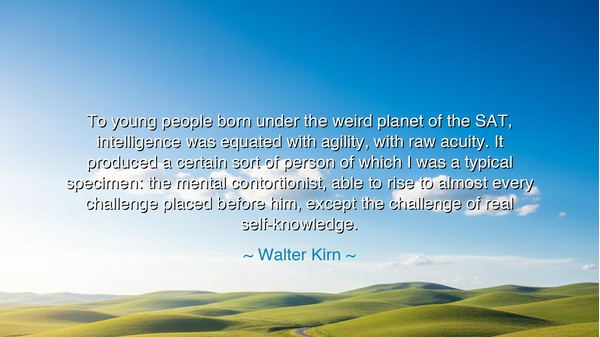
To young people born under the weird planet of the SAT
To young people born under the weird planet of the SAT, intelligence was equated with agility, with raw acuity. It produced a certain sort of person of which I was a typical specimen: the mental contortionist, able to rise to almost every challenge placed before him, except the challenge of real self-knowledge.






Hearken, children of contemplation, and attend to the words of Walter Kirn, a voice reflecting upon the trials of intellect and the shadows they conceal: “To young people born under the weird planet of the SAT, intelligence was equated with agility, with raw acuity. It produced a certain sort of person of which I was a typical specimen: the mental contortionist, able to rise to almost every challenge placed before him, except the challenge of real self-knowledge.” Pause upon these words, for they reveal a truth both timeless and piercing: the triumphs of the mind, however dazzling, may falter when confronted with the innermost truths of the soul.
Kirn begins with the recognition of intelligence as celebrated by the external world. In the realm of tests, exams, and academic challenges, the measure of a person often becomes speed, precision, and cleverness—a capacity to perform mental feats under scrutiny. The young, nurtured in this environment, become adept at navigating complexity, excelling in contests designed to prove wit and reasoning. Yet, Kirn warns, this external prowess may obscure the deeper journey of self-knowledge, a challenge far more profound than any examination.
History offers mirrors of this principle. Consider the life of Blaise Pascal, a child prodigy and mathematical genius. His intellect allowed him to unravel the mysteries of numbers and the cosmos, yet his personal introspection and grappling with faith revealed struggles that intelligence alone could not resolve. Kirn’s reflection resonates here: mastery of the mind does not guarantee mastery of the self. Even those who shine brightest in public arenas may falter when the mirrors of conscience and introspection are held before them.
Even in modern life, the same tension persists. The prodigious student, trained to solve problems, ace examinations, and impress with cognitive agility, may find the subtleties of emotional life, moral discernment, and personal authenticity elusive. Kirn’s metaphor of the mental contortionist captures this paradox: the mind bends, twists, and leaps to meet every external demand, yet the inner landscape—the self—remains opaque, uncharted, and unmastered.
The essence of Kirn’s insight lies in humility and awareness. To honor intellect without neglecting self-reflection is to cultivate wisdom. The ancients taught that the pursuit of knowledge, if divorced from understanding of the self, risks vanity, hubris, and disconnection. True accomplishment arises not from the ability to navigate challenges alone, but from the courage to confront one’s desires, fears, and limitations. The mind must serve the soul, not dominate it.
Practical wisdom emerges from this reflection. Cultivate intellect, but balance it with introspection. Seek challenges not only to demonstrate cleverness, but to illuminate character. Ask of yourself: what are my motives, fears, and aspirations? The cultivation of self-knowledge demands patience, honesty, and the willingness to endure discomfort, for it is through understanding oneself that wisdom and integrity flourish alongside intelligence.
Moreover, Kirn’s reflection underscores the importance of education in its fullest sense. True learning is not merely the accumulation of skill or fact, but the alignment of intellect with moral discernment and self-awareness. Those who master both the mind and the inner life become leaders not only in thought but in virtue, capable of guiding themselves and others with insight and empathy.
Therefore, generations to come, remember Walter Kirn’s counsel: intelligence alone is insufficient. The mental contortionist may conquer every test, yet stumble before the challenge of self-knowledge. Pursue not only mastery of the world, but mastery of the self. Reflect upon your motives, confront your fears, and nurture wisdom as you cultivate intellect. In doing so, you ensure that your mind serves not merely for display, but as a faithful guide toward truth, authenticity, and enduring human flourishing.
If you wish, I can also craft a more poetic, allegorical version of this reflection, portraying intellect and self-knowledge as twin journeys through a labyrinth, suitable for meditative or heroic narration. Do you want me to do that?






AAdministratorAdministrator
Welcome, honored guests. Please leave a comment, we will respond soon